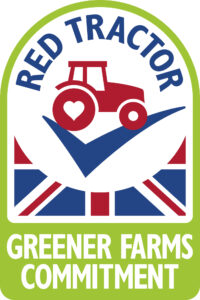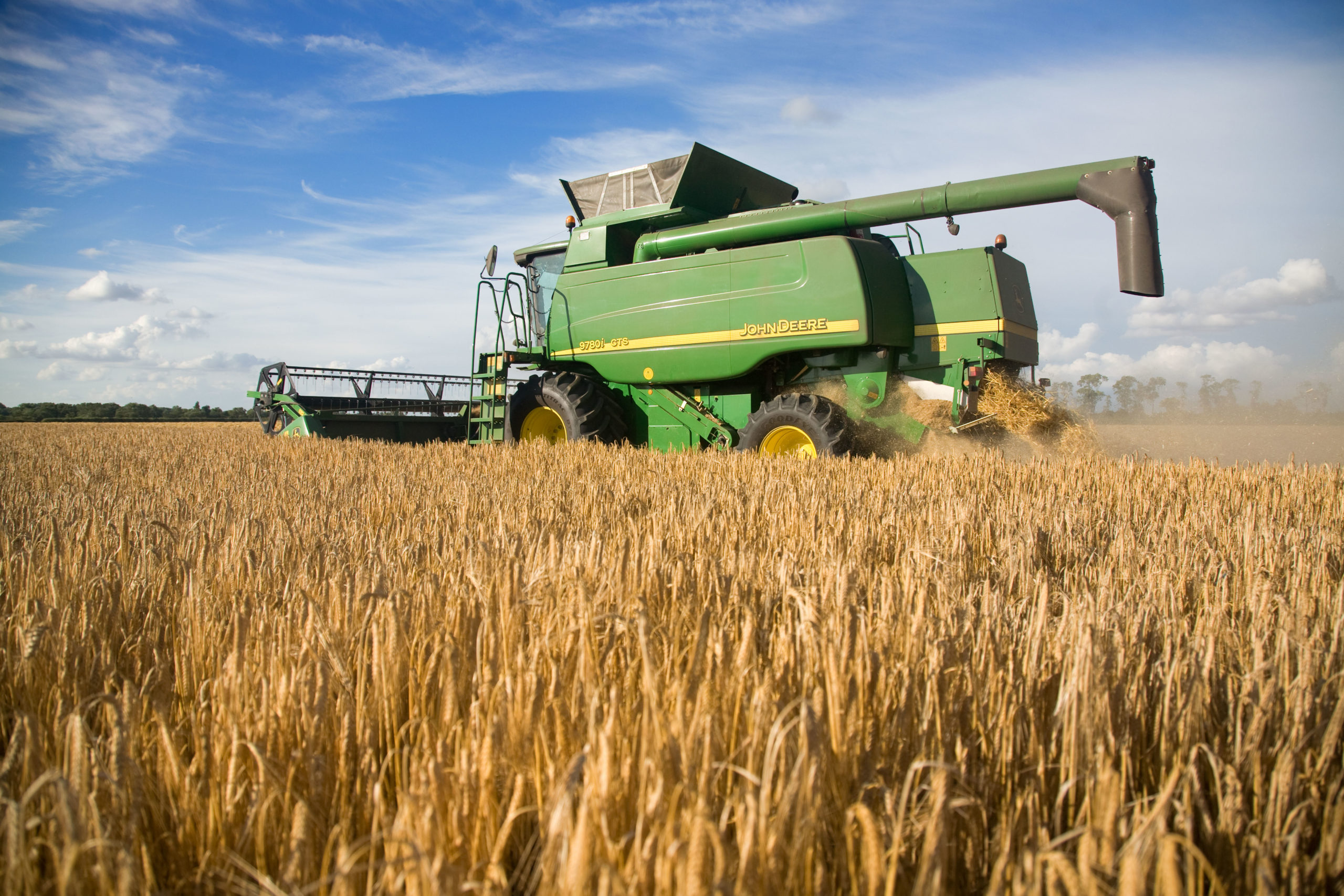Red Tractor’s Main Board has set a firm timetable to make its Greener Farms Commitment (GFC) available from 1 April 2024. Red Tractor has been working on this environment module since 2020, recognising that the pressure on Retail, Out Of Home (OOH) operators and brands to source their primary produce more sustainably, could lead to a multitude of audit demands on the supply chain and particularly farmers.
Meeting market demand
Concerned about these increasing audit demands, Red Tractor has been developing an additional, voluntary module designed to meet the needs of the market with a single consistent industry approach. This offers farmers, processors, and packers one set of common criteria. The outcome is the Greener Farms Commitment which has the full support of businesses represented by the British Retail Consortium.
Andrew Opie from the British Retail Consortium (BRC) said: “Retailers are under increasing pressure to disclose how their sourcing policies promote positive management of soil, water and biodiversity both to consumers and investors. The new Red Tractor Greener Farms Commitment optional module offers the opportunity for farmers to deliver that assurance in a consistent, efficient scheme. Farmers in other countries are already embarking on similar schemes but we feel the Red Tractor scheme puts British farmers in the strongest position to demonstrate their credentials alongside quality and provenance to British consumers.”
Throughout the development work, Red Tractor has been determined to secure this unprecedented level of support. This has involved interviewing every major retailer, OOH operator and many leading brands; ensuring alignment with DEFRA’s Sustainable Farming Incentive (SFI); meeting the aims of critical organisations such as WWF and WRAP; whilst also conducting cost versus benefit research through the Andersons Centre; and trials with 25 farms.
Committed to farming with environmental focus
Red Tractor’s GFC is a voluntary addition which will operate very differently from its typical core standards. It enables farmers to make commitments and track their own progress across five key areas for environmentally focused farming: Carbon foot printing; Soil management; Nutrient management; Waste management; and Biodiversity. It will recognise other schemes or programmes such as the SFI and other devolved government schemes, reducing the cost and complexity, and making it as easy as possible for farmers to complete.
The GFC will have its own logo, enabling farmers and British agriculture to demonstrate their environmental credentials to consumers, whilst also differentiating the high quality of British products compared to international competition.
A different approach to answer changing requirements
From 1 April 2024, the scheme will be open to the supply chain across all sectors where members are already certified against Red Tractor’s core standards. However, the GFC is designed to be a very different experience for farmers who choose to take part. The GFC will be administered by Red Tractor directly, rather than by appointed Certification Bodies. Unlike core standards, the GFC does not require the same thing at every farm, but instead requires farmers to register a plan for progress that is unique to their circumstances, and then measure their success and learning against that.
Red Tractor is setting up a dedicated Development Advisory Panel (DAP) to oversee the detail, operation, and evolution of the GFC. Their first task will be to give feedback on the technical content of the module before it is finalised and published. This will help to ensure its practical application by sector. The DAP will include representation from across the supply chain including experts from Red Tractor’s Sector Boards and Technical Advisory Committees, plus third-party expertise where required.
 Red Tractor CEO, Jim Moseley said: “We’re providing the supply chain with a definitive timetable for making the Greener Farms Commitment available on 1 April next year. With support from so many major retailers, the sector has a unique opportunity to make this common industry approach work.
Red Tractor CEO, Jim Moseley said: “We’re providing the supply chain with a definitive timetable for making the Greener Farms Commitment available on 1 April next year. With support from so many major retailers, the sector has a unique opportunity to make this common industry approach work.
“The initiative takes a new approach which will offer benefits to everyone. It gives Red Tractor farmers a new way of differentiating their product and a consistent framework to talk about their environmental credentials. The GFC is designed to protect farmers from future audit demands, costs and complexity. While some farmers may not be facing these questions from their customers yet, there is clear evidence from some agricultural sectors that alternative schemes have added cost, duplication and complexity for Red Tractor farmers.
“For processors and packers, the common industry approach should reduce the need for a multitude of product lines to be segregated, which could be substantial if customers start to develop their own bespoke programmes. For retailers, out of home operators and brands, the GFC provides the evidence they need to show that their sourcing strategies are from farmers committed to looking after the environment.”
Gavin Hodgson, Director of Agriculture at Sainsbury’s said: “Sainsbury’s is very supportive of initiatives to drive forward work in the sustainability space and sees Red Tractor Greener Farms Commitment as a positive step to giving farmers a framework to develop and make real progress. Having widely available, streamlined approach for the industry is important to simplify asks for farmers and ensure the industry as a whole is working towards these important common goals.”
Steve McLean, Head of Agriculture & Fisheries at M&S Food said: “Red Tractor’s ‘Greener Farms Commitment’ offers farmers a single consistent route to demonstrate the positive steps they are taking on the environment including carbon footprinting and biodiversity, whilst avoiding duplication of audits and administration. In our view it will allow UK farmers demonstrate the important part they play and offers UK agriculture a clear and positive path to reducing its impact on our environment and importantly in demonstrating the great work that UK farmers do day-in, day-out to create wildlife habitats and mange biodiversity on farm. If the scheme is successfully launched, and taken up by farmers, it will allow us support the industry initiative and not replicate through our own initiatives.”
Claire Lorains, Group Quality, Technical and Sustainability Director at Tesco said: “To deliver on our climate and nature commitments it’s vital we partner with suppliers and farmers to effectively measure, and improve the impact food production has on soil, water and biodiversity. We believe the Red Tractor Greener Farms Commitment can help us deliver on these commitments by setting a strong baseline environmental standard that supports the right frameworks to measure and manage. Our customers are increasingly seeking out assurances that the farms that supply us are doing the right thing for the environment, alongside our efforts to demonstrate the quality and provenance of British sourced products. We are ready to work in partnership with our farmers and suppliers to support a phased implementation of the Red Tractor Greener Farms module.”
Sophie Throup, Technical and Sustainability Director, Morrisons said: “The Greener Farms Commitment is an important step in helping us as a retailer evidence the steps farmers are already taking to look after the environment. We know that customers are increasingly focused on how the food they eat impacts the planet; we also know from talking and working with farmers in our own supply chain that much is being done already. This modular option gives us a way of being able to talk to customers about the steps farmers are taking, whether this is starting their journey with a carbon footprint, to delivering improvements to soil health and structure, and considering biodiversity and waste. We welcome this new module and look forward to continuing to work with farmers and the Red Tractor team to ensure its success.”
Joseph Keating, Senior Agriculture Manager, Co-op said: “Co-op is very proud of our 100% British sourcing across all protein and our support of British Agriculture, which holds a world leadership position. As an industry it is vital we continue to find ways of working together to address the challenges of climate change and sustainability. Co-op is supportive of the voluntary Red Tractor Greener Farms Commitment as it provides a single industry approach which aims to simplify the landscape for farmers. We know carbon footprinting is essential in demonstrating how, as in industry, we are reducing our impact and this commitment provides the opportunity to show the wider benefits farmers can contribute in managing biodiversity, water and soil.”

